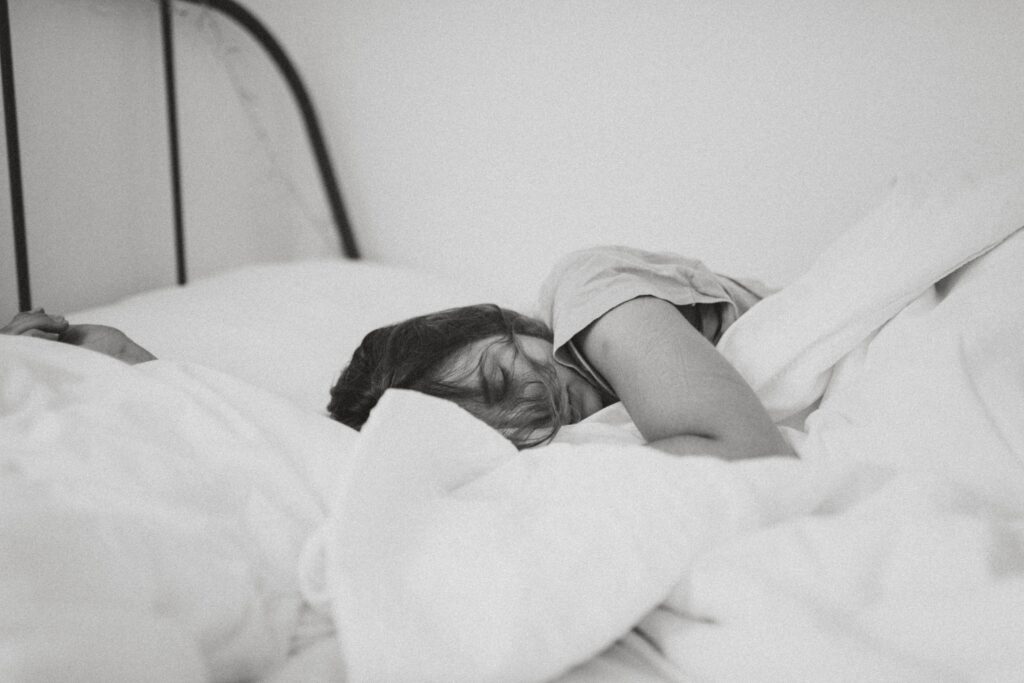Sleep Myth Busting

Our sleep can be significantly disrupted as we go through menopause. It might be finding it hard to get to sleep or waking up in the middle of the night and being unable to get back to sleep. Or simply waking up feeling unrefreshed, morning after morning.
Learn about some of the key sleep myths written by one of our experts Dr Maja Schaedel.
To find out more about what you can do to improve your sleep, book a free discovery call to talk to one of our menopause experts.
Myth 1: It’s ok, I’ll catch up on sleep at the weekend
If sleep is so important for our health and well-being it makes sense to capitalise on whatever sleep we can get, right? WRONG. This is one of the most common mistakes we make.
Although it is important to get sufficient sleep, we are in danger of experiencing “social jetlag” – this is when we try to “catch up” on our sleep at the weekend but in doing so we disrupt our circadian rhythm and put our sleep quality for the following week at risk.
This is because we rely on “sleep pressure” to sleep. Sleep pressure builds up during the day and enables us to sleep at night, maintaining the balance between sleep and wakefulness over time known as sleep-wake homeostasis. The longer a person stays awake, the stronger their sleep pressure becomes.
Therefore, when we have a long lie-in, we often spend less time awake during the day which can disrupt the balance and get in the way of good sleep for the following night(s). This is why keeping the same wake-time everyday can protect your sleep.
Myth 2: A caffeine pick-me-up helps me get through the afternoon
Many people try to cut down on caffeine but what time is too late and is caffeine really that bad? We rely on the build-up of a chemical in our brain during the day called adenosine which helps us to feel tired and sleepy. Caffeine gets in the way of us developing “sleepiness” by blocking the adenosine receptors in the brain and therefore getting in the way of sleepiness developing. This can delay the time you fall asleep by delaying the circadian clock. So how long does caffeine actually last in your system? Well caffeine has a half-life of 6 hours and a quarter-life of 12 hours which means that if you drink a cup of coffee at midday, one eighth of the caffeine is still in your system at midnight. Even for people who seem to be unaffected by drinking caffeine, one study showed drinking caffeine before bed resulted in a 20% reduction in deep sleep. This is why it is best to limit caffeine to the morning only.
Myth 3: Getting an early night is the best thing for my sleep
A common way that people try to maximise their sleep is by getting an early night but does this always lead to more sleep? Actually no. One of the difficulties with getting into bed early is that it can get in the way of you developing sleep pressure. This is the build-up of adenosine - a chemical in the brain which, when there’s enough, signals that it is time to sleep.
If you spend less time awake during the day by getting into bed earlier, it can result in you finding it harder to fall asleep in the first place or you wake up during the night or early in the morning. If you are prone to sleep difficulties, feeling less sleepy at bedtime can then trigger a vicious cycle of insomnia where you start to feel concerned that you are not falling asleep quickly or you start to worry that you won’t feel well rested the following day.
These types of concerns can then make it even harder to fall asleep. This is why it is really important to only go to bed when you feel really sleepy and to try to keep your bedtime at roughly the same time.
Myth 4: If I can’t sleep, I should stay in bed because at least I’m resting
This can actually lead to an increase in our stress hormones, such as cortisol and adrenaline which in turn lead to an increase in your heart rate, an increase in your core body temperature and an increase in your rate of breathing. These physiological changes are features of the autonomic nervous system commonly known as the Fight/Flight/Freeze Response.
These responses occur when our body detects threat or danger and they are the exact OPPOSITE of what your body needs to do in order to fall asleep. Therefore, staying in bed often makes it more likely for the Fight/Flight/Freeze response to occur and therefore makes it more difficult to fall asleep.
Although it is difficult to get out of bed, if you find you are not falling asleep after 20minutes or so it is best to get out of bed and engage in a relaxing activity like reading for 15-20 minutes. This allows your body to relax and step out of the threat response mode, making it easier to fall asleep.
Learn more about the menopause:
Want to understand more about the menopause and how WomenWise can help you beat your symptoms? Check out the rest of our website and you can also book a free discovery call with one of our friendly experts.

Stay up to date with the latest menopause news by signing up to our mailing list
Newsletter Sign-up (popup)
Stay up to date with the latest menopause news